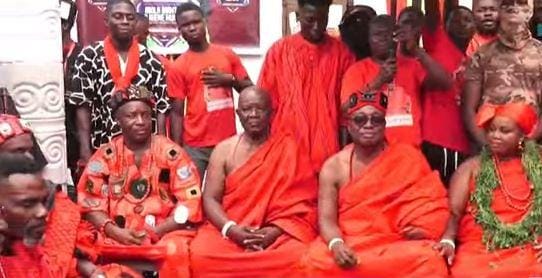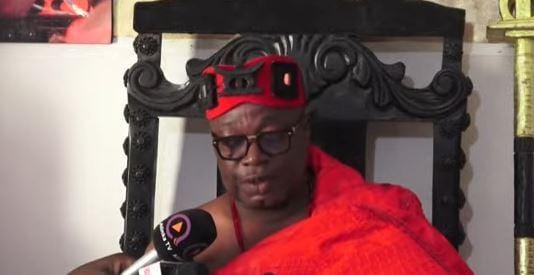Traditional leaders in Ga Mashie are calling on the government to place youth development at the forefront of Ghana’s development agenda.
This call was made during the 2025 Homowo Festival, a sacred and spirited occasion that celebrates triumph over famine and the blessings of abundance.
Rooted deeply in Ga tradition and spirituality, the Homowo Festival, which symbolises the hooting at hunger, is a celebration of resilience.
It commemorates a season of plenty after the Ga’s were once in history plagued by famine.
In Ga Mashie, the day begins long before the skies are clear. Households awaken to the sound of bustling kitchens and the rhythmic beating of drums as women, young and old, prepare Kpokpoi, the sacred dish of the day.
Passed down through generations, the preparation of Kpokpoi is a ritual in itself. At a family compound in Otublohum, women gather in harmony, their seasoned hands transforming steamed and fermented cornmeal into tradition. The palm nut soup and smoked fish that accompany it aren’t a mere delicacy, but a symbol of the purpose of homowo.
“There is a distinction between the Kpokpoi we eat and what we sprinkle. The latter is prepared at the Chief’s palace. However, the various houses supply the Chief with Kpokpoi in case of shortage during sprinkling,” Vida Dede Botchway, a resident of Ga Mashie, told Channel One News.
Kpokpoi is more than a meal; it is a statement. Each bowl is served with warmth, unity, and ancestral reverence. In every bite lies a story, a prayer, and a shared memory.
But the dish is not just for filling the belly; it is for honouring. The ceremonial sprinkling of Kpokpoi, performed with reverence, is believed to appease the spirits of the Ga ancestors, invoking blessings of peace and prosperity.
The ritual begins with the Gbese Mantse, Nii Ayi Bonte Adoten (Head of Military) of the Ga State, who performs the first sprinkling before reporting to the Ga Mantse, King Tackie Teiko Tsuru II. Only then is the practice extended to other traditional quarters, including Sempe, Abola, Otublohum, Asere, and others collectively known in local parlance as Ga Mashie Akutsei
The pounding of traditional drums, the crack of ceremonial muskets, and the vibrant dance performances fill the streets with life. Homowo, in full swing, becomes a vivid reminder of the Ga identity: rich, proud, and enduring.
Amidst the pageantry, traditional authorities seized the moment to advocate for unity and youth empowerment, especially in light of recent tensions surrounding chieftaincy disputes.
“Every individual, regardless of age, gender or background, should feel empowered to contribute to our community narratives. We should invest in our youth,” Abola Mantse, Nii Ahele Nunoo III said.
The Abola Mantse also urged government action against illegal mining, referencing the tragic helicopter crash of August 6th, which claimed the lives of eight Ghanaians
Homowo, however, is not only a cultural milestone; it is an economic lifeline. Local businesses, pubs, food vendors, and artisans see a surge in patronage as revellers flock to Ga Mashie to partake in the festivities.

Source:channelonenewsonline.com


